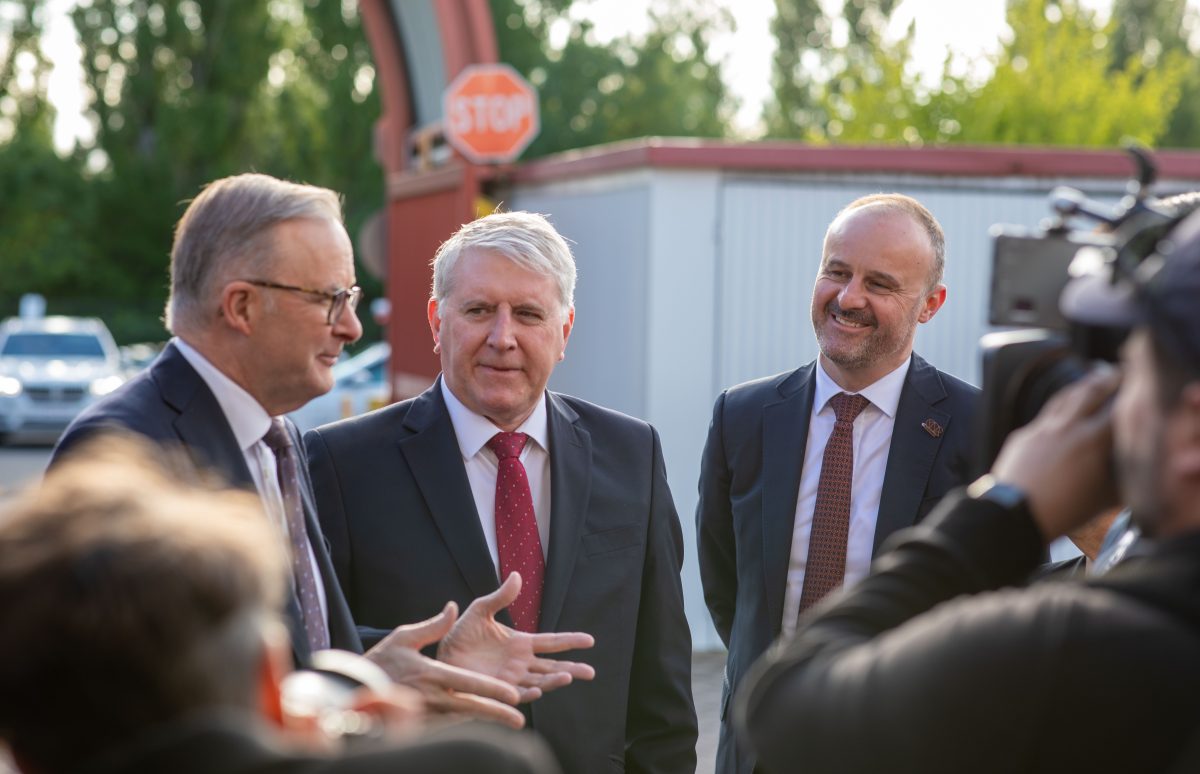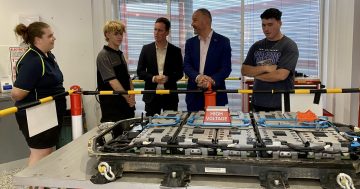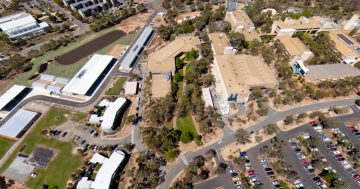
Prime Minister Anthony Albanese and Federal Skills and Training Minister Brendan O’Connor joined ACT Chief Minister Andrew Barr at CIT to announce the National Skills Agreement. Photo: Supplied.
For the first time in more than a decade, all state and territory leaders have signed off on a National Skills Agreement with the Commonwealth in a bid to boost workforces and transform the Vocational Education and Training (VET) sector.
The $12.6 billion agreement was agreed to in National Cabinet last night (16 October) and seeks to implement reforms to address critical skills needs across the country.
Prime Minister Anthony Albanese said the country needed to train Australians for the jobs of today and the jobs of tomorrow.
“This important National Skills Agreement (NSA), alongside our very successful Fee-Free TAFE places, will mean more boilermakers, more chefs, more aged care workers, more child care workers, and more Australians with the skills that they need, but also the skills that our economy needs,” he said.
Commonwealth funding for each state and territory is available under the NSA. If it’s all accessed, it will translate to more than $30 billion in funding.
The funding includes an extra $2.4 billion in flexible funding for jurisdictions to deliver skills for critical and emerging industries.
Identified priorities include:
- Clean energy and net zero transformation of the economy
- Australia’s sovereign capability, including advanced manufacturing skills, national security, food security and construction
- Care and support services
- Ensuring Australia’s digital and technology capability.
One major reform is the establishment of a nationally networked TAFE Centres of Excellence, which will involve partnerships between TAFEs, universities, jobs and skills councils, and industry.
$325 million will be used to establish the centres, along with $100 million to support, grow and retain the VET workforce. A National TAFE leadership network to promote a ‘cutting-edge curriculum’ will be established for $155 million.
Federal Skills and Training Minister Brendan O’Connor said having TAFE at the heart of the agreement would “kickstart real change”.
“The TAFE sector has endured periods of underfunding, impacts of deregulation, loose rules of VET market entry, a lack of national cohesion and an obsession for competition at the expense of collaboration,” he said.
“By providing genuine national leadership in partnership with states and territories, we are building a system that is greater than the sum of its parts.
“A high-performing and world-class VET sector is crucial for achieving a fairer society and a stronger economy.”
Other funding areas nationally include:
- $214 million for Closing the Gap initiatives to be designed in partnership with First Nations peoples, to be led by them
- $250 million to improve VET completion rates, including women and others who face completion challenges
- $142 million to improve foundation skills training capacity, quality and accessibility
- $116 million to improve VET evidence and data.
ACT Chief Minster Andrew Barr said the agreement would support the government’s vision to grow Canberra’s workforce to 300,000 by 2030.
“This agreement has been a long time coming … it’s been a complex task but one that the National Cabinet identified as absolute priority,” he said.
“The [inclusion of] a bespoke response for each state and territory is a really significant outcome, and for the ACT, it means an opportunity to be a national leader in electrification, in the transition to a net-zero economy.
“This is a landmark agreement, one that wasn’t easy to arrive at, but there was a willingness from the federal government to work with the states and territories, and that is what was absent over the previous decade and why we haven’t had an agreement since 2012.”
He said the government was particularly interested in expanding opportunities for people to study in the care economy, cyber defence and national security.
“[These are] all critical areas of employment and growth within the ACT economy and the broader Canberra region,” Mr Barr said.
“It’s a great opportunity to move forward now, to deliver something positive for our communities and to be able to work together.”
Specific ACT funding in the NSA includes:
- More than $24 million in matched ACT-Commonwealth funding for TAFE Centres of Excellence, with a focus on the ACT’s transition to a net zero economy
- $6.5 million in matched funding for Closing the Gap initiatives
- $14 million in matched funding to improve VET and apprentice completion rates
- About $13 million matched funding to assist with collaboration between CIT and other public training providers
- Close to $1.5 million to improve access to foundation skills and learning.
The five-year agreement will take effect from January 2024.





















